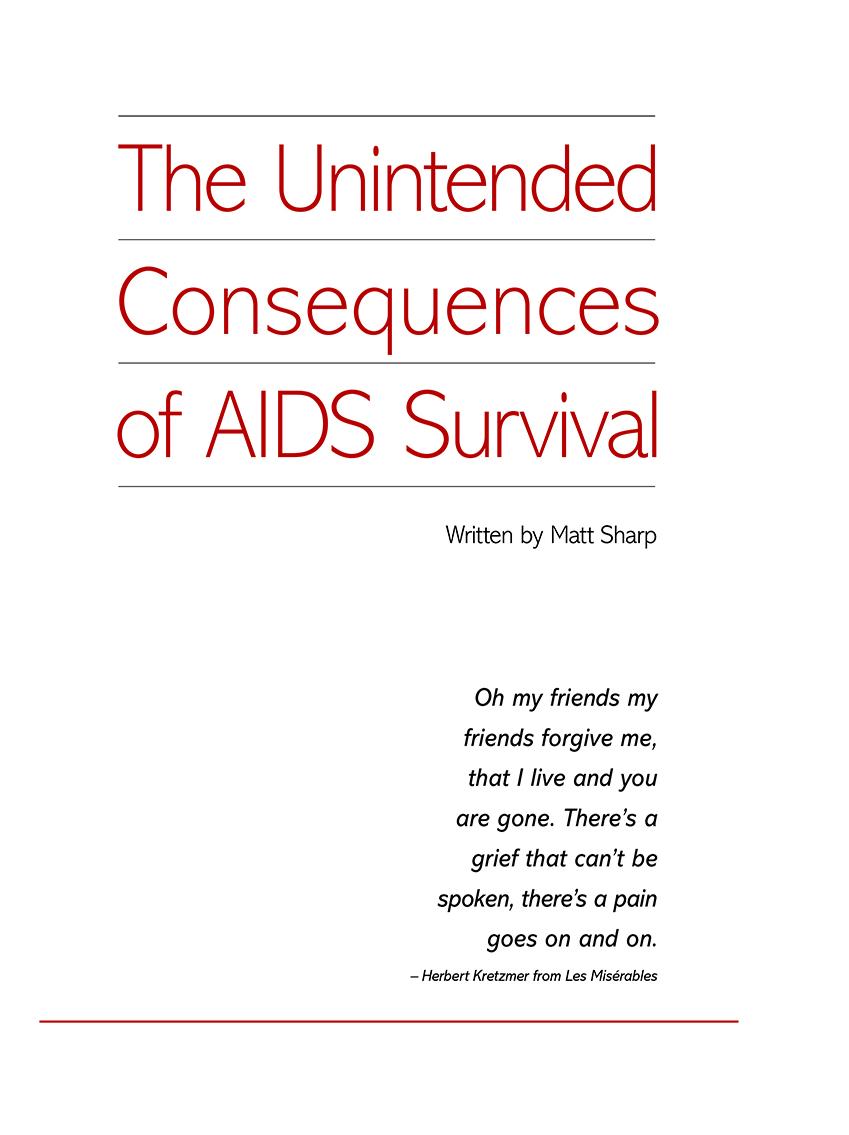The Unintended Consequences of AIDS Survival
New Report Details Challenges as the Epidemic Ages

On World AIDS Day 2016, the first chronicle of its kind describing a series of unique health and psychosocial challenges in HIV/AIDS survivors in the United States is available to download online. The Unintended Consequences of AIDS Survival is a 24-page status report that calls attention to the lives of people living with AIDS, particularly long-term survivors, who feel their psychosocial needs are not prioritized in the AIDS landscape. This, added to earlier physiologic aging now widely studied in survivors with years of traumatic stress and unprocessed grief, has essentially become the rallying cry for a new HIV movement.
The paper also depicts a graphic representation of major AIDS historic time points side by side with epidemiological data, in order to provide a reality check of emotions throughout the epidemic. Evidence gathered from behavioral research, clinical science, epidemiology, recent articles from local press, and AIDS publications are referenced.
An important component of the report shows how San Francisco once again leads national HIV/AIDS trends. Beginning in 2013 a few AIDS activists banded together to mobilize survivors in order to raise awareness, provide a forum, and create change in their lives. Firsthand testimony was gathered at town hall forums, policy advocacy meetings, weekend retreats, and in support groups and social gatherings. By describing these survivor mobilization efforts in this document, other jurisdictions across the country will learn lessons that can be tailored for their own communities.
Chris Bartlett, Executive Director of the William Way LGBT Community Center in Philadelphia and a member of The Reunion Project national steering committee said, “The Center, partnering with other community-based organizations, has taken the lead in building a vibrant community of long-term survivors in our region, who are committed to thriving as elders and building a powerful intergenerational response to the current needs of people growing older with AIDS.”
The report also aims to further educate, mobilize, promote discussion, and stir creation of new research, new interventions, policy recommendations, advocacy and programming across the country. “Once mobilized to fight for survival, long-term survivors continue to lead in fostering meaningful social ties and reliance,” says Robert M. Grant of the Gladstone Institutes and the San Francisco AIDS Foundation. “Their stories serve to bring us together to heal from the trauma and fear of the early HIV/AIDS epidemic, and to help us face the emerging challenges of aging, changing health care, employment, and isolation.”
As more survivors come out of isolation to tell their stories, each one is unique, some woeful and horrific, but always revealing. As more people become aware of the complicated issues, and recognize there is something they can do to change, they are emerging as a new movement once ravaged, now re-energized. Author Matthew Sharp, a 28-year AIDS survivor, is uniquely qualified to pen this particular survivor story as an eyewitness on the front lines in the AIDS fight. He is one of a handful of AIDS activists leading survivor mobilization efforts nationally with The Reunion Project, a series of ongoing town hall summits taking place around the country. The Reunion Project is supported by Bristol-Myers Squibb and Test Positive Aware Network (TPAN), publisher of Positively Aware magazine. Bristol-Myers Squibb commissioned Sharp, who is one of the founders of The Reunion Project, to author the paper.
Read The Unintended Consequences of AIDS Survival or go to http://www.www.tpan.com/reunion-project to read more.
This report was supported in part by Bristol-Myers Squibb with no editorial input. The views expressed in the report do not necessarily reflect those of Bristol-Myers Squibb.
Contact
Jeff Berryj.berry@tpan.com
5050 N Broadway St 300
Chicago, IL 60640
Ph: (773) 989-9400 Ext. 260

